|
Canal Road
Milton
Gravesend
01474 326931
https://whatpub.com/canal-tavern
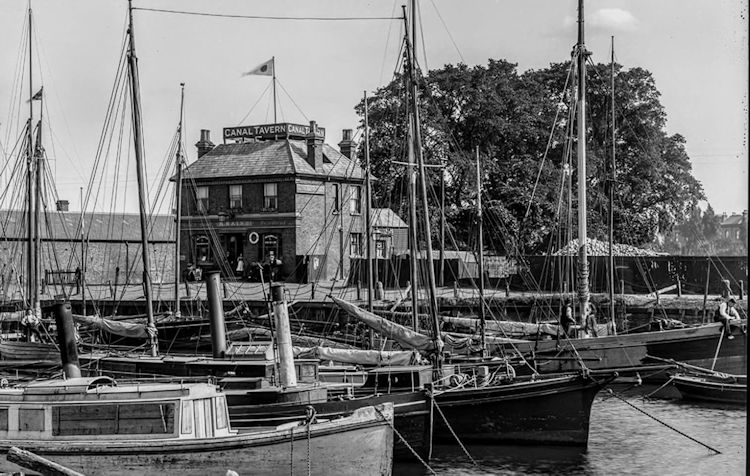
Above photo, 1894. |
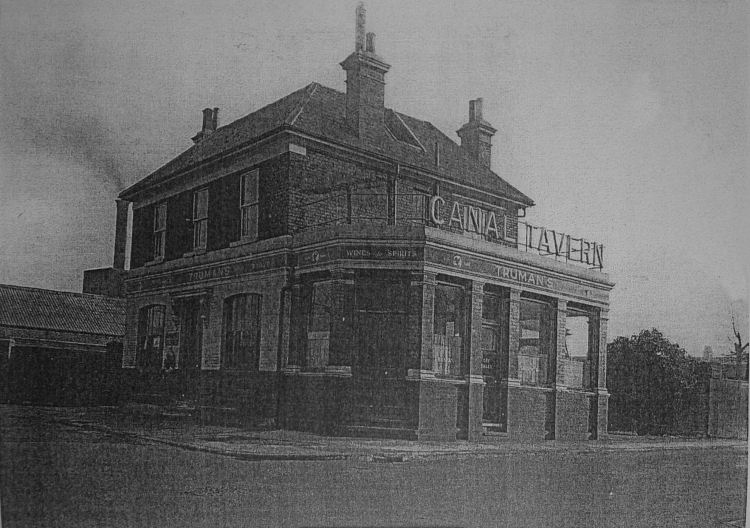
Above photo, date unknown. Kindly supplied by John Hopperton. |
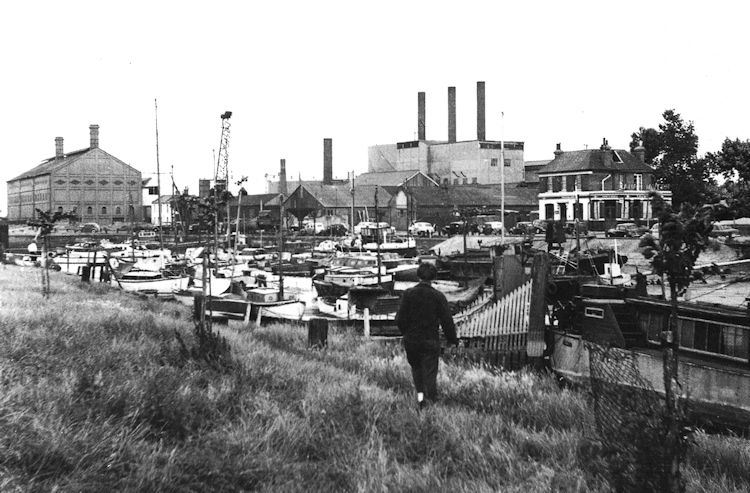
Above photo, 1958, showing the canal basin and pub (right). Kindly sent
by Jason Kemsley. |

Above photo, date unknown. |
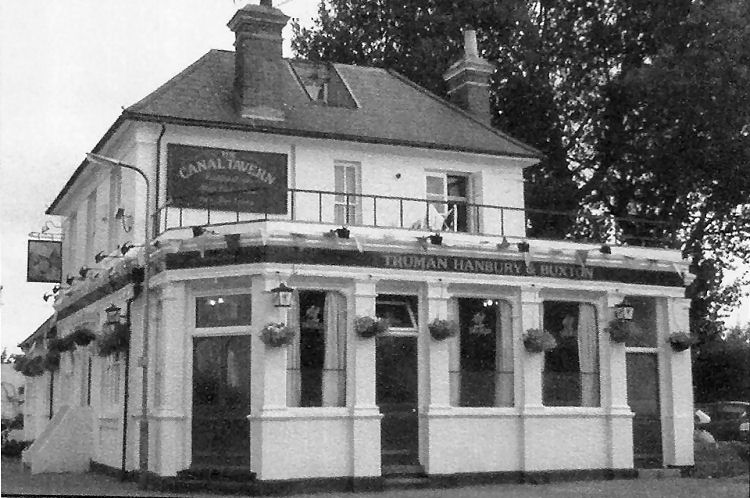
Above photo 2002. |

Above photo, date unknown. |
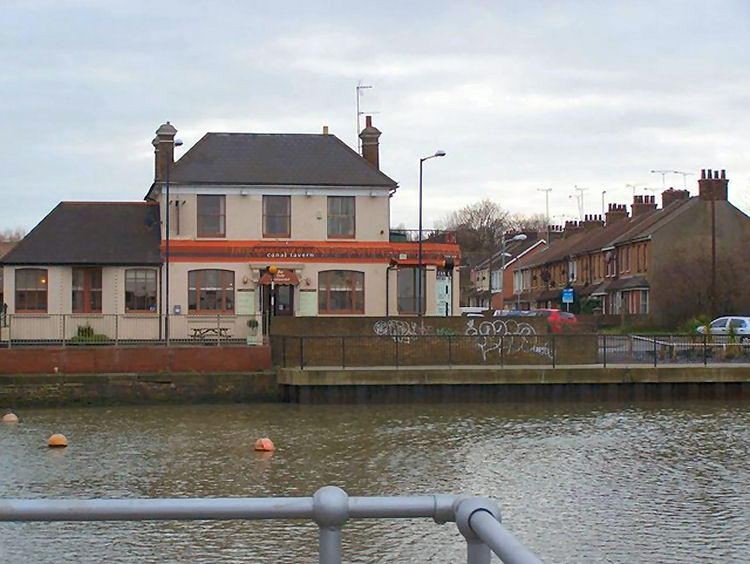
Above photo 2008 by David Anstiss
Creative Commons Licence. |
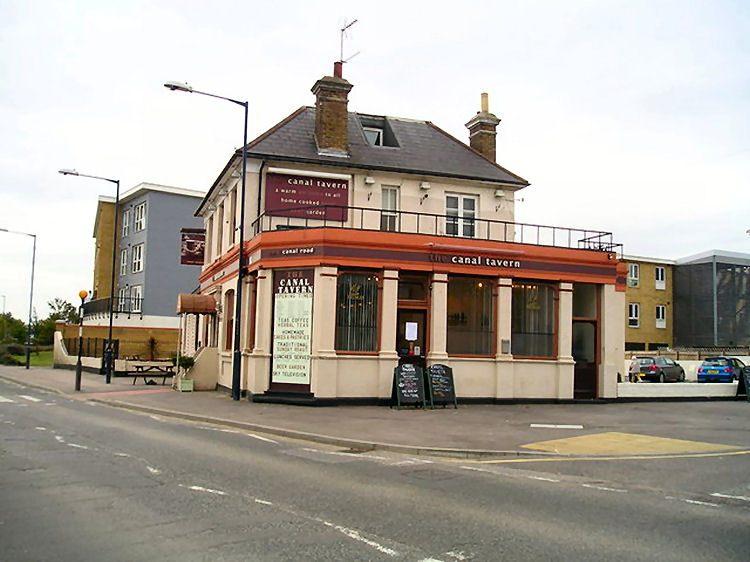
Above photo 2010 by canalandriversidepubs.co.uk
Creative Commons Licence. |
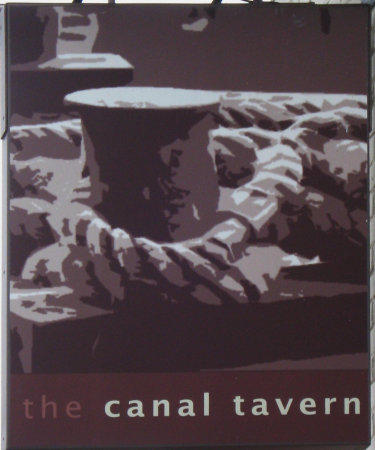
Above sign, 2010, kindly sent by Roger Pester. |
The pub was closed for a short period in the 1850s when it lay empty for
some reason.
In 1845 Thomas Barker dies of consumption but in the same year they also
lose 2 of their children. This is then followed in 1848 by another daughter
but its noted that the "Canal Tavern" is recorded as the place of death so
the family are still living there.
Mary marries James Leeds in 1846 and their daughter dies there in 1849 (3
months old) but James is now noted as Victualler on her death certificate.
It is suggested that the close proximity to the canal, river and railway
along with poor sanitation at the time that there was a lot of disease which
may have contributed to the poor health of the family and why they closed
for a while.
|
From the Kentish Gazette 20 November 1838.
On Wednesday an inquest was held at the "Canal Tavern," Milton,
next Gravesend, before Mr. C. J. Carttar, Coroner for Kent, on the
body of John Morris, a boy aged ten years, who was killed by a blow
from a capstan on the banks of the Thames and Medway Canal,
adjoining the "Cock,"
a short distance from the River. It appeared in evidence that on
Sunday last a barge was entering the basin of the Canal at Milton,
by means of a hawser round the capstan on the pier, when the
pressure of water caused the barge to give a lurch, and the capstan,
in which several iron bars were fixed, flew round with great
violence. The deceased was running past the capstan as it began
moving, and one of the bars struck him on the head and killed him on
the spot. It was stated that several other fatal accidents of a
similar nature had occurred on the same spot, and the Jury were
unanimous in their condemnation of the practice of having the bars
fixed in the capstan, by which many persons had lost their lives.
Mr. Heath, a gentleman connected with the Canal Company, said the
spot on which the capstan was fixed was private property; but
admitted there was nothing to prevent any one going near the capstan
when the barges were going in and out. The Jury said the place was a
public thoroughfare, and persons were constantly passing over it,
and some precautions ought to be taken. The Coroner said he
concurred in all that had fallen from the Jury, and said unless
chains were placed across the path in such a way so as to prevent
any one approaching the capstan while it was revolving, the Company
might be indicted for a nuisance, and other steps taken to remedy
the evil. Mr. Heath promised a compliance with the wishes of the
Jury, who, after some strong observations, returned a verdict of
"Accidental Death." Deodand on the bar 1s.
|
|
Burials St Peter & St Paul, Milton next Gravesend. 1846-1864.
22 Oct 1846 Edward Barker, Canal Tavern aged 5.
25 Apr 1848 Ellen Barker, Canal Tavern aged 13.
16 Aug 1849 Annie Leeds, Canal Tavern aged 3 months.
7 Sep 1849 William Pepper aged 45. Found drowned and brought to Canal.
17 May 1850 Henry Stanton, Canal Tavern aged 31.
31 Jul 1851 William Basden, Canal Tavern aged 32.
20 Aug 1851 Robert Caggett, Canal Tavern aged 42.
|
|
Gravesend Reporter, North Kent and South Essex Advertiser 18 January 1862.
EXTENSIVE CONFLAGRATION & ALLEGED INCENDIARISM.
The town for some time past has been free from any of those large fires
for which in former years it was rather notorious, but on Friday night
last one took place, which was of considerable magnitude, and might, but
for a providential set of the wind have vied with any previous disaster
of this nature. On the north quay of the canal basin has stood for many
years a very large shed built of brick most substantially, with a
massive roof of timber slates, and with three pairs of lofty lattice
gates, both in the north and south fronts. There was also capacious
stabling for a number of horses. These premises were formerly, it is
well known, in the occupation of the firm of Nettleingham, Son. & Hills,
large coal merchants. For some years past it has been a portion of the
property of the South Eastern Railway Company in that part of the town,
and has been rented of them by Mr. William Lake, of Chalk, as a
depositors for straw, of which very generally there was a large
quantity. On Friday last there were from 300 to 500 loads in these
stores. The adjacent buildings on the south side and eastward are the
soap works of Messrs. Huggens and one or two cottages, one the residence
of Mr. Buckland, foreman of Messrs. Huggins' works. On the north side
and to the east are two houses and separated from them only by a narrow
entry, the "North Star" beerhouse, in the occupation of Mr. Goodwin, all
these premises forming a block and all connected. Eastward of this
block, only a short distance off, are some cottages, the property of Mr.
Willis. Still further some cottages, the property of Mr. Willis. Still
further to the eastward are Mr. Todd's steam flour mills and Mr.
Broadbridge's establishment, the Albion Baths. All these buildings are
situated between the canal and the river, and all sufficiently close to
have come more or less within the influence of the flames, but for the
providential set of the wind alluded to.
On Friday night the sheds had been locked up as usual by Mr. Lake’s
manager, Mr. Sneezum, and all was perfectly safe. About twenty minutes
to eleven, however, Mr. Stoddart, the dock master of the canal basin and
general custodian of the railway company’s property there, who resides
in a cottage to the west of the shed, separated from them by a narrow
lane and his garden, was roused from his slumbers by Lee, captain of one
of Mr. Lake's barges, which had been loading straw alongside the quay
during the day, who had been roused himself in his barge by a man named
Staggs, who first discovered the fire. Lee told Stoddart a fire had
broken out in the shed and was already making rapid progress. Stoddart
turned out immediately, naturally in great anxiety, and rushed out in
his night dress to the spot, when he found the building was all in
flames. He very humanely recollected that a horse belonging to the
inspector of the company, Mr. Liptrol, was in the stable and locked up,
the key being in the carter's possession. He directly gave crowbars to
Charles Hoggood, a bargeman, and another man, and bade them break open
the stabledoor and liberate the unfortunate horse, who was now screaming
with terror at the smoke and heat. The men speedily resend the horse,
after using great exertions to break in, and it was taking over to Mr.
Bigmore's "Canal Tavern," who put it up in his skittle ground. Mr.
Stoddart, who energetically exerted himself, even forgetting to return
and clothe himself in a garb more suited to the weather, had a barge
which was partly laden with straw and close alongside the burning
building, removed out from the vicinity of the flumes. He had also sent
to the town for the police and the engines. Necessarily, however, a
space of time must elapse before they could arrive, and the fire now
raged furiously, presenting a mass of flame 80ft. square. The greatest
consternation prevailed among the occupants of the buildings above
described, who were men, women and children, running about in their
night dresses in the greatest alarm and confusion. The adjoining soap
works were considered to be in immanent peril, and Mr. Buckland's first
act was to secure the books and documents in the counting house of his
employers, which was in the front part of the works, but the door was
locked. He, however, smashed in the door with his foot and succeeded in
removing all the books, papers, &c.
At the first sign of the fire the sentry on the batteries at "New Tavern
Fort" reported the fact to Lieutenant Ryerolt, who lost no time in
sending out the fort engine, together with a guard, who were of great
service in discharging water on the imperilled soap factory. They had
been proceeded, however, by Mr. White, the Superintendent of the police
and the fire brigade, who with that promptitude for which he is eminent,
had on hearing of the fire, mustered his brigade of firemen, and
proceeded to the fire with the engines at the utmost speed, but the
inflammable nature of the contents of the shed was such and of so large
a quantity that by the time he arrived the roof was falling in, and all
that could be done was to keep the fire from extending to the soap
works, which was done by throwing large quantities of water on that
building. The fire continued all day on Saturday and was hardly
extinguished on Sunday. Mr. Luke's loss is estimated at over £500. The
building as before stated, was the property of the South Eastern Railway
Company.
At the time the fire was discovered then was almost a calm, but very
shortly after the wind rose, lightly blowing from the S.S.W., therefore
carrying away the flame from the soap works in a N.E. direction. This
providential course of the wind saved the entire block. Had the wind set
in strong from the N.W. as it did on the following evening (Saturday)
the destruction of property would have been most considerable. In the
meanwhile strenuous exertions were made to keep the buildings of the
soap works cool with a plentiful supply of water. Mr. Buckland, jun. had
his valuable collection of designs removed to Mr. Bigmore's, "Canal
Tavern," who kindly took charge of them.
Mr. Goodwin, of the "North Star," and the numerous occupants of that
and the adjoining houses on the north east portion of the block were in
the constant dread of seeing their homes burnt at any instant, and Mr.
Goodwin filled his house with coalies who had come ashore from the coal
hulks to remove his furniture, and though the occasion was itself
serious, the scene of confusion was so ludicrous as to excite merriment.
Stationing himself at his beer engine he declared emphatically that the
beer "shouldn't be burnt," and bade his dusky attendant drink it out,
giving it away to all hands in the most lavish manner. The consequences
may be easily imagined; the Coaleys and their loads of effects tumbled
up and down, and such a degree of damage was done that fire itself could
hardly have surpassed.
Of course by about eleven o'clock a large concourse of spectators had
arrived on the spot, for the sky was lighted up for miles round, and
both sides of the basin we crowded, and while the fire engines of the
borough and the fort were throwing water on the threatened buildings,
Mr. Bigmore’s beer engine and other taps were as busily plied in
supplying the needs of the labourers at the pump. The fire formed a
grand spectacle from Milton-place and Park-place and the higher parts of
the town overlooking the river, which was quite illumined, displaying
the shipping and the opposite country. There was only one casualty and
that fortunately was not attended with serious results; one of the
firemen, named Corby, fell into the basin whilst at work, but was almost
immediately rescued. It is a lamentable thing to reflect that this fire,
which might have been so much worse, was the work of an incendiary,
according to the evidence in Monday's police.
|
|
Maidstone Journal and Kentish Advertiser, Monday 19 September 1864.
Coroner's Inquest.
An inquest was held on Wednesday last, at the "Canal Tavern," by E. A.
Hilder Esq., on the body of James Heath, a child about 7 years of age.
Deceased was the son of Richard Heath, residing at the "Canal," and the
mother stated that on Monday she, with deceased and her other children,
had been to Shorne, hopping, and, on returning, left deceased near Mr.
Todd's mill with other children. From the evidence of the sister, who is
9 years old, it appeared that the others went home, while deceased
stayed behind to look at a dog in the water and would not come when
called by this witness. The boy not coming home, search was made for
him, but he could not be found, until Edward Cackett, a labourer, also
reside at the "Canal," seeing the sister crying, assisted in the search,
and found deceased in the Canal, and got him out at once, but he was
quite dead.
A verdict of "Found Drowned" was returned by the jury.
|
|
From the Gravesend reporter, North Kent and South Essex Advertiser, Saturday 15 May 1880.
Gravesend police Court.
Richard Payne was charged, as a rogue and a vagabond, with gambling in a
field near the "Canal Tavern," on the previous Saturday night.
Mr. Superintendent Berry said that between 8 and 9 o'clock on the night
in question he went to the field, where a kind of fair was being held.
He saw defendant in charge of a table, on which there were a number of
divisions, with a spindle in the centre. Around these were a number of
coconuts. The table was surrounded by boys, who put penny pieces on the
divisions, defendant reserving to himself the vacant spaces. Whilst
witness looked on, there were 12 or 14 pennies put down, and defendant
always won.
Defendant said he had not been at work many minutes when the
superintendent saw him. There were six squares on the board, and the
winner could either have a coconut or 5d, whichever he liked, so that he
(defendant) only stood to win a penny if all the squares were full.
Mr. Barry said defendant had been previously convicted at Chatham of a
similar offence.
Defendant said he had a wife and 8 children, so he hoped the magistrates
would deal leniently with him, and impose a fine if they could.
The Bench did deal leniently with him, for they only imposed a fine of
3s., with alternative of 7 days.
|
|
From The Era (London, England), January 28, 1882; Issue 2262.
To Circus, Menagerie, and Wax-Work Proprietors.
To Be Let, the Best Position in the Town.
Apply to R. T. Chapman, "Canal Tavern," Gravesend, Kent.
|
|
From The Era (London, England), Saturday, August 17,
1889; Issue 2656.
To Circus Agents, Showmen, etc., Travelling in Kent.
A Large Meadow To Let on Hire, Terms, Proprietor,
"Canal Tavern," Gravesend.
|
LICENSEE LIST
SMITH Alexander 1824-28+

GARDNER Benjamin 1832-40+

ROBERTS Henry 1841+ (age 45 in 1841 ) )
BARKER Thomas 1844-45 dec'd
LEEDS James (married Barker's widow) 1846-52+ (age 51 in 1851 ) )
BIGMORE James Chew 1861-65+ (age 50 in 1861 ) )
SIMMONS Thomas 1870-71+ (age 54 in 1871 ) )
LUNGFORD John 1874-78+
WILLIAMS Richard 1881+ (age 42 in 1881 ) )
CHAPMAN Richard 1882+
CHART Robert 1891
RAINE Henry 1891-1903+ (age 57 in 1901 ) )

RAINE Emma Mrs 1911-22+ (age 57 in 1911 ) )
WOODMAN Horatio Edmund 1930+
RAMSEY Mr & Mrs M 1988-90+
https://pubwiki.co.uk/CanalTavern.shtml
 From the Pigot's Directory 1828-29 From the Pigot's Directory 1828-29
 From the Pigot's Directory 1832-33-34 From the Pigot's Directory 1832-33-34
 From the Kelly's Directory 1903 From the Kelly's Directory 1903
 Census Census
|








